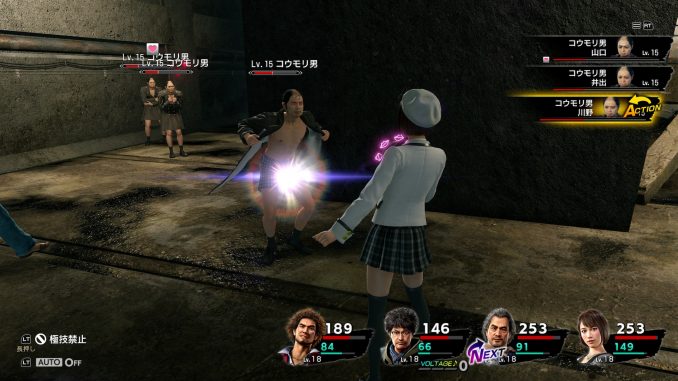
Introduction
If you’re like me, you probably button-mashed your way through your first Shareholder Meeting and lost a boatload of stock. There are some important moving pieces to Management Mode that the game does a very poor job of explaining.
Due to the lack of critical information, many players struggle with a minigame that is really fairly simple; this is very unfortunate, because the game expects you to be using it to farm money throughout pretty much the whole game.
This guide is here to do what the game doesn’t. What do all the colored icons mean? Which properties should I buy? How far can I upgrade this property? Read on to find the answers.
Employee Basics
There are four different character stats you need to worry about.

Firstly, the Employee’s Business Stats(#1), which fall into three categories – Product, Service, and Notability.
Secondly, the Employee’s Industrial Specialization(#2); this is the icon that appears above their Shareholder Stats.
Despite being next to “Shareholder Meeting,” Industrial Specialization has no significant effect on Shareholder Meeting performance.)
Thirdly, the Employee’s Shareholder Stats(#3).
Fourth, the Employee’s Shareholder Specialization (#4).
Business Stats affect the Employee’s performance when assigned to properties. Each Property has its’ own Product, Service and Notability ratings. There are two ways to increase these ratings. The first is by directly upgrading them with money, covered in better detail under Property Management. The second is by assigning Employees with those skills to the property.
There are six Industrial Specialization categories. Retail (Green), Nightlife (Purple), Business (Red), Dining (Orange), Recreation (Yellow), and Real Estate (Blue). It should be noted that these names are unofficial – go by color, not by name; the game only tells you what the actual names are when the relevant category is subject to a Retail Boost. I’ll update this guide with the actual names when I have time.
When an Employee’s Industrial Specialization matches a Property’s, their performance will be boosted. For instance, assigning Hanzawa to a Business property will give better results than assigning him to a Retail or Nightlife property.
Shareholder Stats are only relevant during a Shareholder Meeting. Charisma measures how much damage an employee does to Shareholders when interjecting; the higher it is, the more convincing they are. Tenacity measures how much HP the Employee has, and how much damage they take if a Shareholder targets them and isn’t convinced to back down.
Finally, Shareholder Specialization is really the only thing you need to know about in order to take care of Shareholder Meetings. Each Employee, and each Shareholder, has one of three colors – Blue, Red, and Green. These operate under Rock Paper Scissors rules; Blue beats Green beats Red beats Blue. This will be explained in greater detail under the Shareholder Meeting section.
Lastly, Employee Mood should be watched carefully; it is located directly next to Industrial Specialization. Green is best, Orange is okay, Grey is neutral, Purple is unhappy, Red is furious. Employees who are unhappy will work less hard, decreasing profits, and may quit or take offers from your competitors. Employee Mood can be managed from the Employees page; this will be explained under General Interface.
General Interface
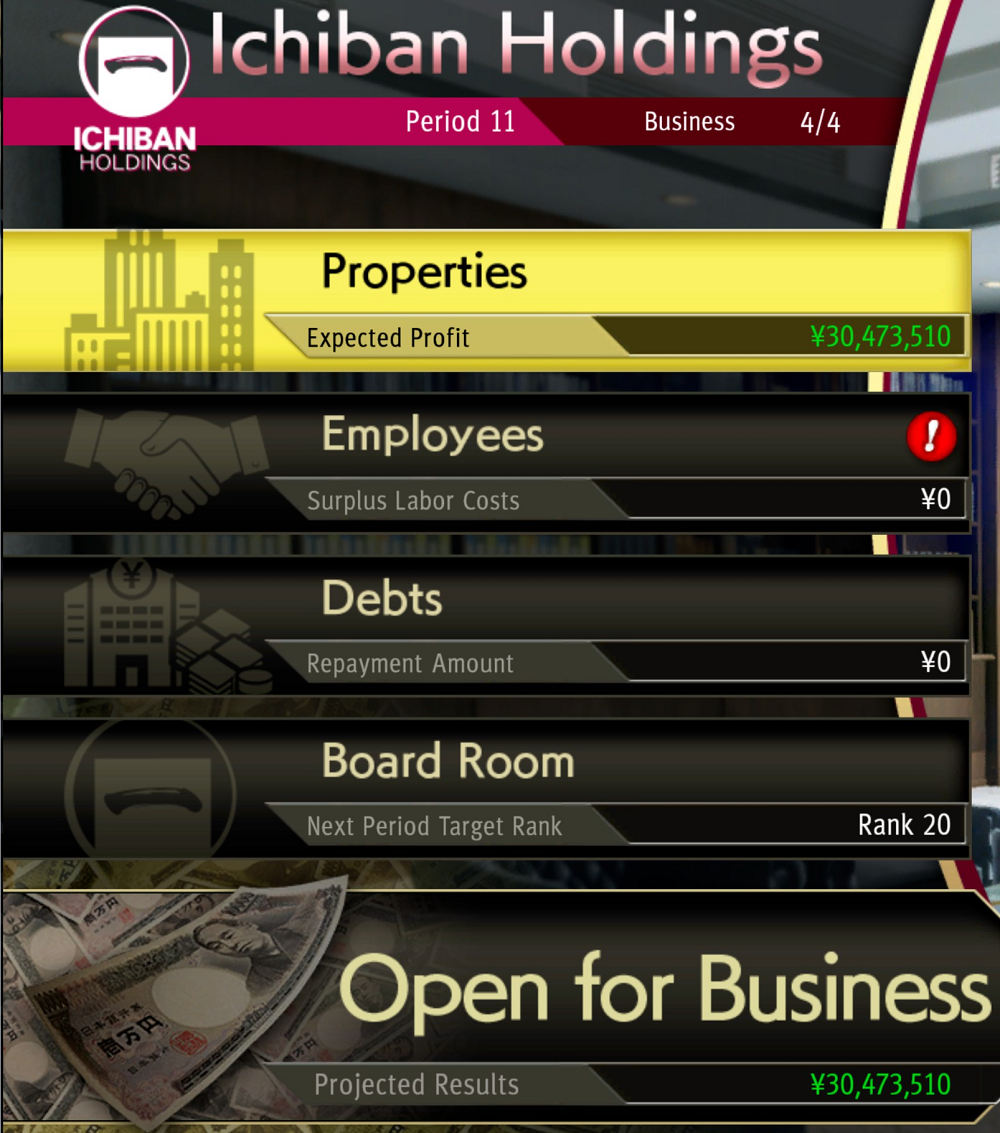
Property is where most of the magic happens. From here, you can Assign Employees to Properties, Upgrade Properties, sell your Properties from the Properties tab, and buy new Properties from the Market.
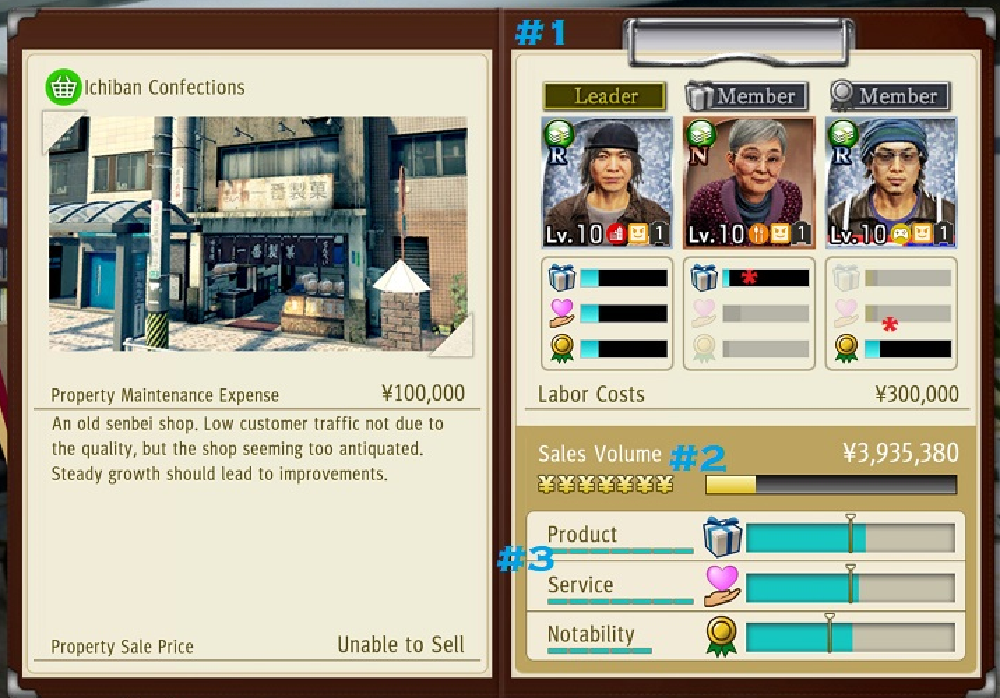
Employees should be assigned to properties based on their Business Stats and Industrial Specialization. Each property can take three Employees (#1). The Manager will improve the business with all three Business Stats; the other two will only improve the business with whatever Business Stat is highlighted for that slot(*). Each Property will have different Business Stat slots for each Employee.

In addition to the available business stat slots for any given property, the player should also keep an eye on their Upgrade Potential(#3), as this can compensate for lacking Employee options. Using Ichiban Confections as an example, Product and Service can be upgraded seven times each, but Notability can only be upgraded five times.
Upgrading Properties allows you to pay cash directly to improve one of the Property’s Business Stats, OR to increase Sales Volume. Increasing Sales Volume will increase profit, but it will also raise the required Business Stats threshold in order to be generating maximum profit.
It can still be profitable to invest in Sales Volume even if you know you can’t meet one of the Stat Thresholds, but consider it on a situational basis.
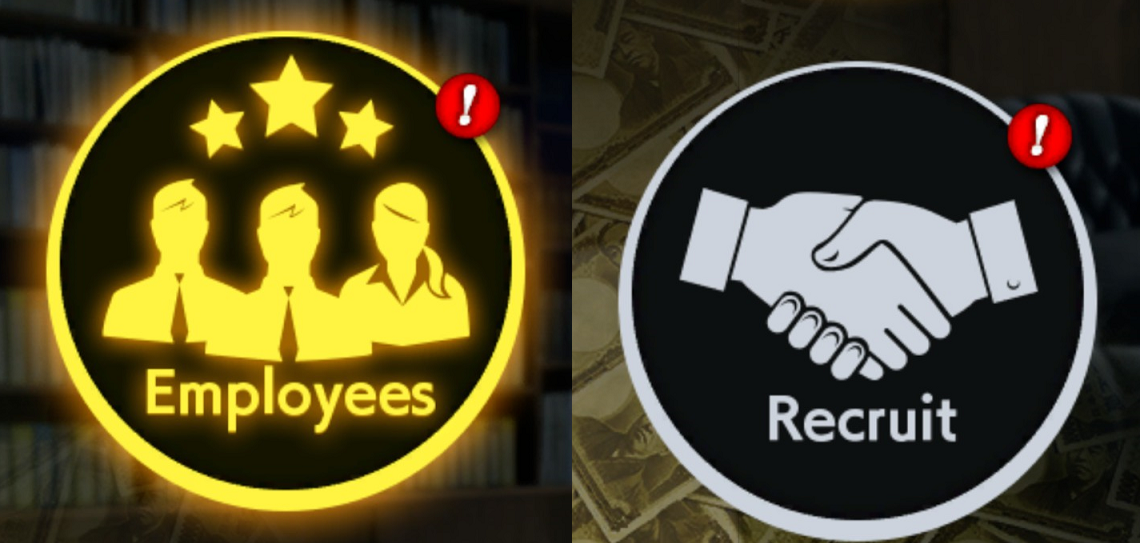
Employees is the second most vital tab on your menu. Employees is used to manage your Employees’ happiness, as well as issuing promotions or layoffs; Recruit is used to hire new employees.

Bonuses (#1) is the primary means of keeping your employees happy. Your options range from a Cheap Bonus to an Executive Bonus; these start inexpensive but become pricey, restoring a corresponding amount of Employee Mood. The higher-ranked your Employees are, the more expensive all four options will become.
Training (#2) is the primary means of rapidly leveling up your Employees, allowing you to pay money to directly rank them up. As with Bonuses, you have four options available, from cheapest to most expensive. Highly-ranked employees cannot learn anything from the cheaper options, requiring pricier investments in order to rank them up.
Promotion (#3) allows you to develop your employee’s Business Stats and Shareholder Skills beyond what they start with, at the cost of raising their salary and making their Bonuses more expensive. Promoting an Employee will also give them a substantial Mood boost.
Layoff (#4) allows you to lay off employees who are no longer useful. While it is important initially to keep costs low, the further you progress into Management Mode, the more you will be able surplus labor costs; it’s a good idea to keep your options open, especially if you anticipate buying a new property soon.
Shareholder Meetings
Shareholder Meetings are your primary tool for increasing your Share Price, and thus keeping up with Nick Ogata’s demands. If you don’t want your kneecaps broken by a very friendly man with a padded baseball bat, this is where you have to step up.
The Shareholder Meetings are easily the worst offender when it comes to how poorly things are explained in Management Mode.
Before you begin, three factors affect your initial Support from the Shareholders. These are Net Worth, Manage Employees, and Current Period Sales to Date. The best possible starting Support rating is 80%; the worst possible is 20%.
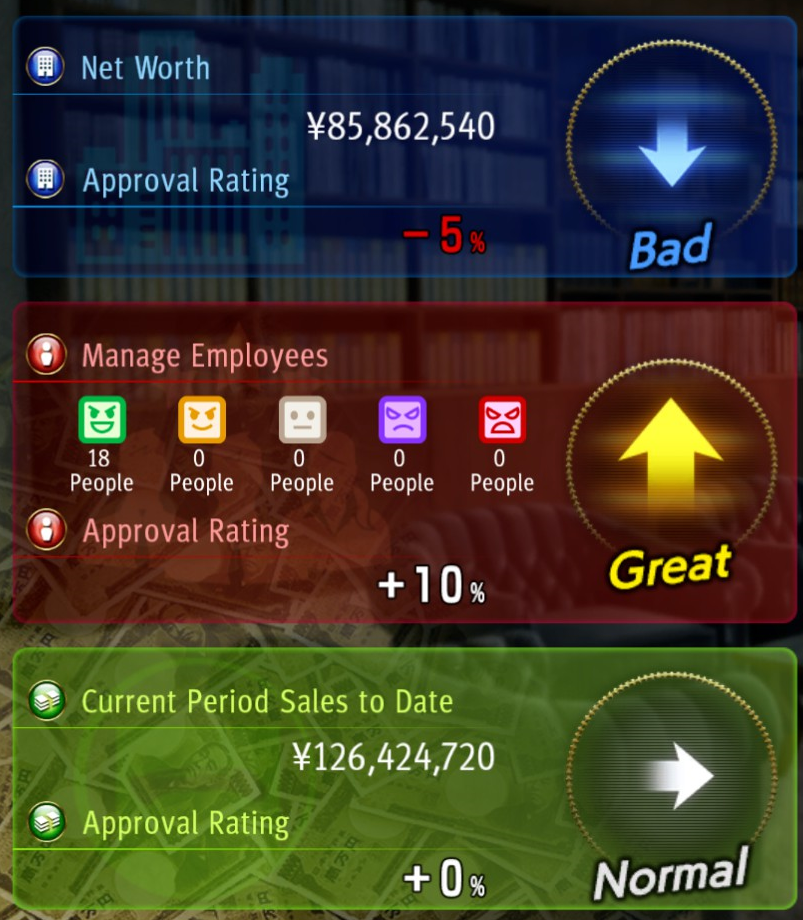
As far as I can tell, Net Worth is both how much your owned properties are worth/have invested, and your current Management Funds.
Manage Employees is based on your Employees’ current moods. The more people you have below Green mood, the worse your evaluation here will be.
Lastly, Period Sales depends on how profitable your businesses are; this, it should be noted, means gross sales, meaning it is not affected by expenditures; it’s strictly the amount of money you’ve earned, before any deductions.
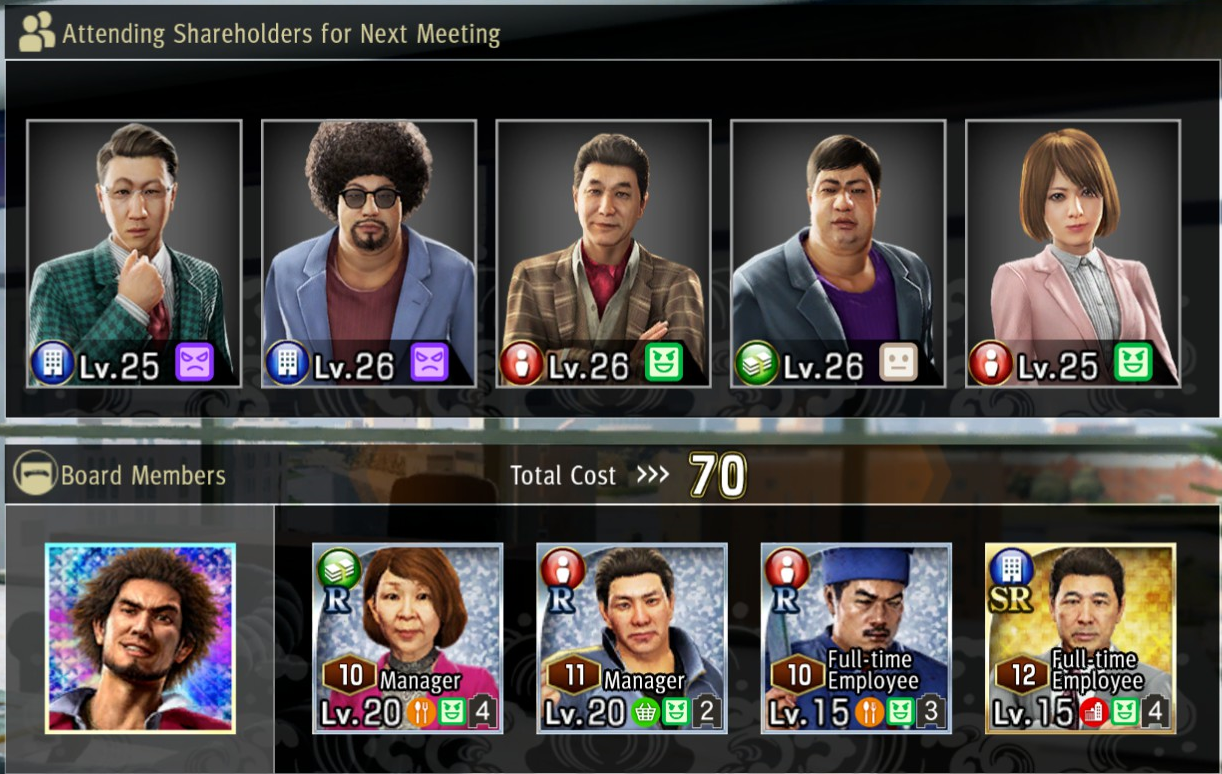
You can bring up to four Employees to Shareholder Meetings to do the actual arguing for you. The game pretends that their Industrial Specialization is important here, but as far as I can tell, it either has no impact, or a very negligible one. Also, Employee Mood has an affect on their performance, so ensure that anyone you plan to bring along to the Shareholder’s Meeting is at maximum Mood.
The UI for Shareholder Meetings is unnecessarily complicated; I will now attempt to briefly summarize what you need to know about it.
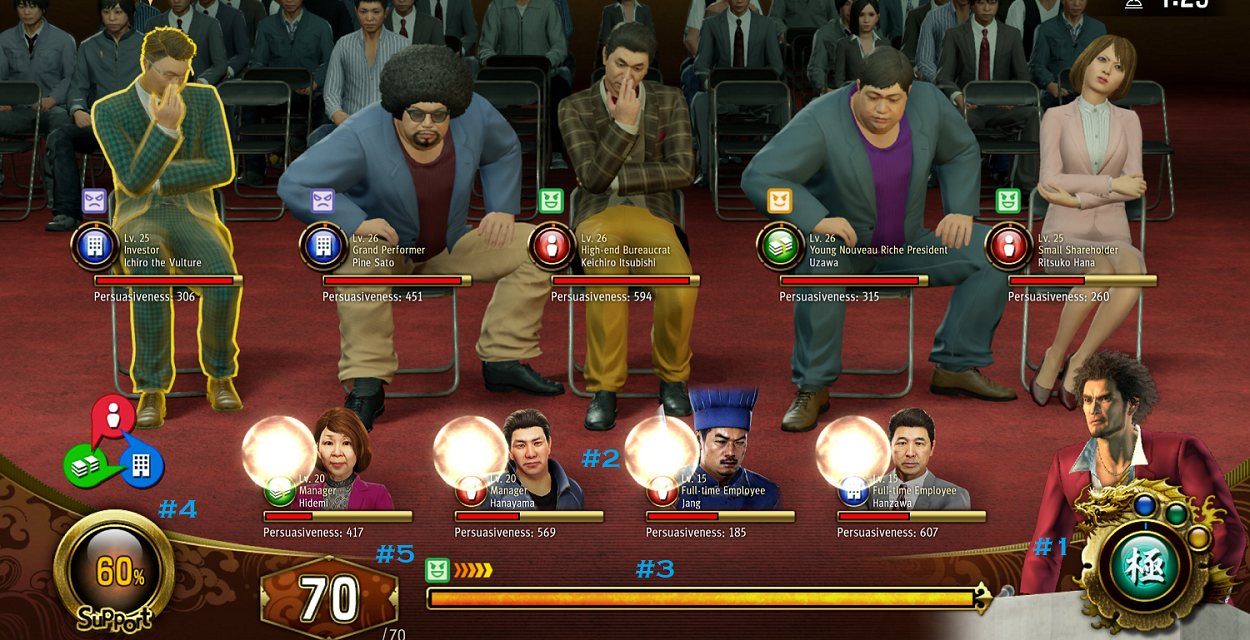
- #1 – This is Ichiban’s Special Meter. Each time the Meter fills, it will give Ichiban one point towards Essence of Extreme Groveling. Saving up your points will make the attack more powerful, with Lv. 3 being the strongest possible level.
- #2 – Your Employees have their own Persuasiveness ratings and HP bars; the former is based off Charisma, the latter off Tenacity. When you take a question from a Shareholder, they will Lock On to an Employee; failing to convince them will result in the targeted Employee taking damage based on the Shareholder’s Persuasiveness.
- #3 – Your Action Bar fills over time; each Employee has an Action Cost, visible during Counterattack Mode. Suppose an Employee costs 10 Action Points to command; if you have 60 points in your Action Bar, you can command them six times.
- #4 – Your Support Meter shows how many of your Shareholders are confident that the business is in good hands. The higher this is at the end of the meeting, the better.
- #5 – Your total available Action Points; an identical meter showing the Action Cost of each Employee shows up during Counterattack Mode.
Each Shareholder will raise their hand; Shareholders who are more persuasive, or in bad moods, become impatient faster. Shareholders who are in good moods, or less persuasive, will wait longer before getting angry if you don’t call on them.
Once you call on a Shareholder, they will question you – by which I mean “yell at you,” making an Argument. The color of their speech bubble will tell you what color Employee you should use to shut them down.
You have two main weapons during Shareholder Meetings. The first is the Shareholder Specialization System.

Each Shareholder and each Employee has a Shareholder Specialization stat; these stats operate under Rock Paper Scissor rules. It should be noted that a Shareholder’s Specialization does NOT mean that they’re limited to that stat! A Shareholder with Green Specialization may make a Blue Argument. Pay attention to the color of their speech bubble.
Blue beats Red beats Green beats Blue. In simple terms, if a Shareholder’s speech bubble is Green..

Choose an Employee with Red Specialization to counter their argument. The Shareholder has three HP Shields; once these HP shields are broken by Employee interjections, you can make your counter-argument. A counter-argument from a properly-colored Employee with suitable Charisma will usually break all three at once.
This will shut the Shareholder up for a few seconds, during which time you can order any Employee to attack them, damaging the Shareholder’s HP. Employees who counter the Shareholder’s color will do more damage – this is not related to their question! A Red Shareholder can make a Green argument, but they will take more damage from Blue employees’ attacks once the argument is broken.
In simple terms:
Assuming that the Shareholder you call on is Red, but their speech bubble is Blue,
- Use a Green employee to shut them up.
- Use a Blue employee to damage the Shareholder until the window of opportunity expires.
Once a Shareholder’s stamina is depleted, they will sit down and begin to happily clap, applauding either Ichiban’s business sense or his hairdo. You win the Shareholder meeting if all Shareholders are placated in this manner, but you will still get a generous Stock Price boost if you manage to subdue more than half of them before the timer expires.
Your second primary weapon comes from Ichiban’s Essence of Extreme Groveling. As mentioned previously, this attack becomes more powerful if you allow Ichiban’s Special Meter to fill. Rank 1 merely does some damage to all Shareholders, and resets their Impatience Meter. Rank 2 does more damage, heals your party slightly, and prevents Shareholders from acting for a short time. Rank 3 does medium damage, heals your team considerably, and prevents Shareholders from acting for a considerable amount of time.
Essence of Extreme Groveling is best saved for emergencies – if you have multiple powerful Shareholders who are all waiting to ask questions, and you lack the Action Points to take any action to shut them down, a well-timed Lvl 3 Groveling can save you from having a team member knocked out.
Hope you enjoy the Guide about Yakuza: Like a Dragon – The Capitalist Chicken Guide to Management Mode, if you think we should add extra information or forget something, please let us know via comment below, and we will do our best to fix or update as soon as possible!
- All Yakuza: Like a Dragon Posts List

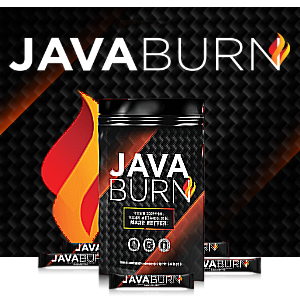
Leave a Reply